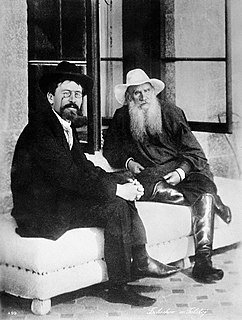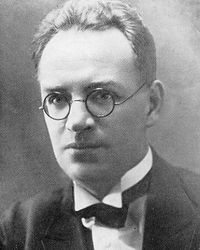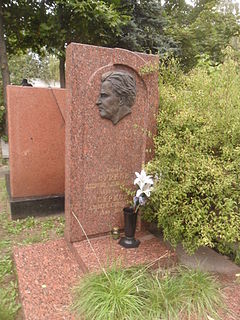
Boris Leonidovich Pasternak was a Russian poet, novelist, composer and literary translator. Composed in 1917, Pasternak's first book of poems, My Sister, Life, was published in Berlin in 1922 and soon became an important collection in the Russian language. Pasternak's translations of stage plays by Goethe, Schiller, Calderón de la Barca and Shakespeare remain very popular with Russian audiences.

Russian literature refers to the literature of Russia and its émigrés and to Russian-language literature. The roots of Russian literature can be traced to the Middle Ages, when epics and chronicles in Old East Slavic were composed. By the Age of Enlightenment, literature had grown in importance, and from the early 1830s, Russian literature underwent an astounding golden age in poetry, prose and drama. Romanticism permitted a flowering of poetic talent: Vasily Zhukovsky and later his protégé Alexander Pushkin came to the fore. Prose was flourishing as well. Mikhail Lermontov was one of the most important poets and novelists. The first great Russian novelist was Nikolai Gogol. Then came Ivan Turgenev, who mastered both short stories and novels. Fyodor Dostoevsky and Leo Tolstoy soon became internationally renowned. Other important figures of Russian realism were Ivan Goncharov, Mikhail Saltykov-Shchedrin and Nikolai Leskov. In the second half of the century Anton Chekhov excelled in short stories and became a leading dramatist. The beginning of the 20th century ranks as the Silver Age of Russian poetry. The poets most often associated with the "Silver Age" are Konstantin Balmont, Valery Bryusov, Alexander Blok, Anna Akhmatova, Nikolay Gumilyov, Sergei Yesenin, Vladimir Mayakovsky, and Marina Tsvetaeva. This era produced some first-rate novelists and short-story writers, such as Aleksandr Kuprin, Nobel Prize winner Ivan Bunin, Leonid Andreyev, Fyodor Sologub, Yevgeny Zamyatin, Alexander Belyaev, Andrei Bely and Maxim Gorky.

Varlam Tikhonovich Shalamov, baptized as Varlaam, was a Russian writer, journalist, poet and Gulag survivor. He spent much of the period from 1937 to 1951 imprisoned in forced-labor camps in the Arctic region of Kolyma, due in part to his support of Leon Trotsky and praise of the anti-Soviet writer Ivan Bunin. In 1946, near death, he became a medical assistant while still a prisoner. He remained in that role for the duration of his sentence, then for another two years after being released, until 1953.

Alexander Alexandrovich Fadeyev was a Soviet writer, one of the co-founders of the Union of Soviet Writers and its chairman from 1946 to 1954.

Andrei Donatovich Sinyavsky was a Russian writer and Soviet dissident known as a defendant in the Sinyavsky–Daniel trial in 1965.

Boris Andreyevich Pilnyak was a Russian and Soviet writer who was executed by the Soviet Union on false claims of plotting to kill Joseph Stalin and Nikolay Yezhov.

Aleksandr Sergeyevich Shcherbakov was a Soviet politician and statesman who was a wartime head of the Political Directorate of the Red Army as well as the director of the Soviet Information Bureau.

Aleksandr Stepanovich Grinevsky was a Russian writer, notable for his romantic novels and short stories, mostly set in an unnamed fantasy land with a European or Latin American flavor. Most of his writings deal with sea, adventures, and love.

Ivan Vasilyevich Panfilov was a Soviet general and a posthumous Hero of the Soviet Union, known for his command of the 316th Rifle Division during the defense of Moscow at the Second World War.

Peredelkino is a dacha complex situated just to the southwest of Moscow, Russia.

Aleksandr Mikhailovich Adamovich was a Soviet Belarusian writer, screenwriter, literary critic and democratic activist. He wrote in both the Russian and Belarusian languages.

Alexander Lvovich Kazembek, often spelled Kazem-Bek or Kasem-Beg, was a Russian émigré and political activist, and founder of the Mladorossi political group.

Alexander Serafimovich was a Russian/Soviet writer and a member of the Moscow literary group Sreda.

The Saint Petersburg Military Engineering-Technical University (Nikolaevsky), previously known as the Saint Petersburg Nikolaevsky Engineering Academy, was established in 1810 under Alexander I. The university is situated in the former barracks of the Cavalier-Guard Regiment where the university was founded.

Bauyrzhan Momyshuly, also spelled Baurjan Momish-Uli was a Kazakh-Soviet military officer and author, posthumously awarded with the titles Hero of the Soviet Union and People's Hero of Kazakhstan.

Pyotr Andreyevich Pavlenko, , was a Soviet writer, screenwriter and war correspondent. He became a member of the CPSU in 1920.

Volokolamsk Highway is a novel written by Alexandr Bek, published in Russian in 1944, with later translations into English, Hebrew, Spanish, Chinese, German and many other languages during the 1940s and '50s. The novel, based on real events in October, 1941, during the Battle of Moscow, describes defensive fighting over several days by a single battalion of the 316th Rifle Division against elements of German Army Group Center. Both for its realism and for its practical advice on infantry tactics in modern war, Volokolamsk Highway became standard reading for junior officers in the Red Army and later Soviet Army, the forces of the arising State of Israel, and most socialist and revolutionary movements during the latter part of the 20th century. The novel has been out of print in English for several decades.

Alexey Alexandrovich Surkov was a Russian Soviet poet, editor, literary critic and high-profile nomenklatura figure, the head of the Soviet Union of Writers in 1953–1959, notorious for his role in the persecution of Boris Pasternak

Tatyana Alexandrovna Beck was Russian poet, literary critic and literary scholar. Member of the Union of Soviet Writers (1978), and also Russian PEN Center, Secretary of the Moscow Writers' Union (1991-1995). Daughter of writer Alexander Bek.



















